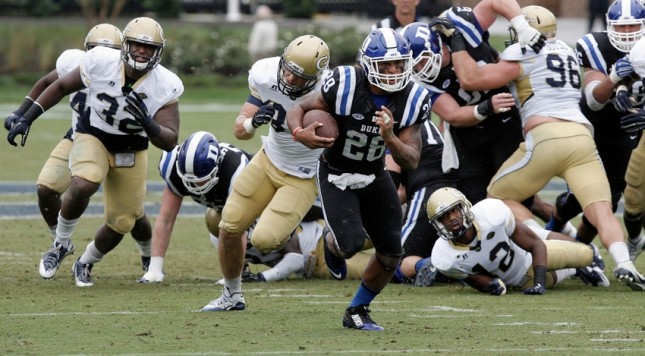We’re nearing the end of the college football regular season. Accordingly, we’re in a much better position to evaluate teams. More precisely, we’re in a better position to not merely figure out where things went right or wrong, but why teams followed a given path.
Two of the foremost examples from the Atlantic Coast Conference are Georgia Tech and Duke, a pair of teams which fell off the pace in the Coastal Division, albeit at different speeds. The way these two seasons unfolded has much to say about the two teams involved, but also the composition of the ACC in 2015.
The ACC is a league with three high-quality teams or — if you wish to divide a little more — one elite team and two extremely good (but not great) teams: Clemson, North Carolina, and Florida State. Clemson’s clearly first. North Carolina and Florida State will not get a chance to settle the debate over number two, so we’ll leave that debate alone.
The rest of the ACC? It’s a jumble. These two teams — Georgia Tech and Duke — are centrally responsible for creating a sense of confusion about the league.
*
These teams played the ACC opener back on Sept. 26. Whereas Duke’s mysterious profile in 2015 began to evolve on that day against the Yellow Jackets, Georgia Tech’s story truly began a week earlier against Notre Dame. At the time, the Jackets were still a blank slate, with many people trusting that they could sustain momentum from 2014 and continue to call the shots in the Coastal Division. The decisive loss they suffered in South Bend was the first eye-opener for observers of Paul Johnson’s team this season. Georgia Tech brought back a veteran offensive line but few skill people beyond quarterback Justin Thomas. Clearly, the offensive line — bullied as it was by Notre Dame’s front seven — was not ready for the Irish.
When Georgia Tech traveled to Durham, N.C., the following Saturday, the basic read on Jackets-Devils was this: Either Georgia Tech learns and reshapes its season, or it allows the journey to deteriorate into disaster.
Duke was clearly the more physical and resolute team in that contest. The Blue Devils weren’t necessarily more potent, but they converted two long kick returns into touchdowns and tacked on an insurance touchdown late in the fourth quarter after a drive start inside the Georgia Tech 40. Duke’s defense won that game, holding Georgia Tech to just 173 rushing yards, a very low number for the triple option.
At the time, it seemed that Duke’s performance was primarily the product of… Duke.
Now, with the benefit of hindsight, we can identify it as the main result of Georgia Tech suffering a hangover, or — to choose a slightly different interpretation — failing to recover from that South Bend spanking for the rest of the season. Whether this was a one-day hangover or a season-long stupor, Georgia Tech played well below its own expectations. Duke benefited in perception from this dynamic on Sept. 26… but the Blue Devils never did have the material to stand up to a talented offense when it functioned well.
Enter North Carolina. Enter Pittsburgh, which is not that deep or imposing on offense but certainly had the tools needed to make the Blue Devils look slow and unresponsive.
Georgia Tech made Duke look better than it was. Duke eventually did regress. Georgia Tech never did climb out of trouble, the Florida State game being a partial exception. (I use the term “partial exception” because Georgia Tech’s offense didn’t figure anything out in that game; only the defense stood particularly tall.)
What do you get? Georgia Tech’s season in ruins; Duke headed to a bowl, but likely with a record just barely north of .500. Duke is a better team and a higher quality win than Tech, but not by the margin or degree suggested by the Sept. 26 encounter.

